- Home
- Iain Banks
Complicity
Complicity Read online
Complicity
Iain Banks
n. 1. the fact of being an accomplice, esp. in a criminal act
A few spliffs, a spot of mild S&M, phone through the copy for tomorrow's front page, catch up with the latest from your mystery source — could be big, could be very big — in fact, just a regular day at the office for free-wheeling, substance-abusing Cameron Colley, a fully-paid-up Gonzo hack on an Edinburgh newspaper.
The source is pretty thin, but Cameron senses a scoop and checks out a series of bizarre deaths from a few years ago — only to find that the police are checking out a series of bizarre deaths that are happening right now. And Cameron just might know more about it than he'd care to admit…
Involvement; connection; liability — Complicity is a stunning exploration of the morality of greed, corruption and violence, venturing fearlessly into the darker recesses of human purpose.
'A remarkable novel… superbly Grafted, funny and intelligent" Times
'A stylishly executed and well produced study in fear, loathing and victimisation which moves towards doom in measured steps" Observer
'Compelling and sinister… a very good thriller" Glasgow Herald
'Fast moving… tightly plotted" Sunday Times
COMPLICITY by Iain Banks
CHAPTER 1: INDEPENDENT DETERRENT
You hear the car after an hour and a half. During that time you've been here in the darkness, sitting on the small telephone seat near the front door, waiting. You only moved once, after half an hour, when you went back through to the kitchen to check on the maid. She was still there, eyes white in the half-darkness. There was a strange, sharp smell in the air and you thought of cats, though you know he doesn't have cats. Then you realised the maid had pissed herself. You felt a moment of disgust, and then a little guilt.
She whimpered behind the black masking-tape when you approached. You tested the tape securing her to the little kitchen chair, and the rope holding it against the still-warm Aga. The tape looked just as you'd left it; either she hadn't been struggling or she had but it had had no effect. The rope was good and taut. You glanced at the shaded windows, then shone your torch at her hands, taped to the rear legs of the chair. Her fingers looked all right; it was a little difficult to tell because of her dark olive Filipino skin, but you didn't think you'd cut off her circulation. You looked at her feet, tiny in the low-heeled black slippers; they appeared healthy too. A drop of urine fell and joined a pool on the tiled floor beneath the chair.
She was quivering with fear when you looked into her face. You knew you looked terrifying in the dark balaclava, but there was nothing you could do about that. You patted her shoulder as reassuringly as you could. Then you went back to the telephone seat by the front door. There were three phone calls; you listened to the answer-machine intercept them.
"You know what to do," his scratchily recorded voice said to each caller. His voice is quick, clipped and vaguely upper-class. "Do it after the beep."
Tobias, old chap. How the devil are you? Geoff. Wondering how you're fixed next Saturday. Fancy a foursome out at sunny Sunningdale? Give me a tinkle. Bye."
(beep)
"Ah… yes, ahh, Sir Toby. Mark Bain again. Ah, I rang earlier, and the last couple of days. Umm… well, I'd still very much like to interview you, as I've said, Sir Toby, but, well, I know you don't usually give interviews, but I do assure you I've no axe to grind, and I do very much appreciate, as a fellow professional, what you've achieved, and would genuinely like to find out more about your views. Anyway. Clearly it is up to you, of course, and I do respect that. I'll… ah, I'll try your office in the morning. Thank you. Thank you very much. Good evening."
(beep)
"You abrupt old bastard, Tobes. Give me a ring about that diary story; I'm still not happy. And get that bloody car phone repaired."
You smiled at that one. That rough, colonial voice, its commanding tone contrasting with the Harrovian chumminess of the first message and the whining, working-class Midland entreaties of the middle one. The proprietor. Now there was a man you'd like to meet. You glanced up into the darkness towards the wall at the foot of the stairs, where there are various framed photographs. There is one of Sir Toby Bissett with Mrs Thatcher, both smiling. You smiled, too.
Then you just sat there, breathing carefully, thinking, keeping calm. You took the gun out once, reaching round under your thin canvas jacket to the small of your back and easing it from between shirt and jeans. The Browning felt warm through your thin leather gloves. You snicked the magazine out and back in again a couple of times and ran your thumb over the safety catch, making sure it was on. You put the gun back again.
Then you reached down, pulled up the right leg of your jeans and slipped the Marttiini out of its lightly oiled sheath. The knife's slim blade refused to glint, until you tipped it just so and it reflected the little, flashing red light on the answer-machine. There was a small greasy smudge on the steel blade. You blew on it and rubbed it with one gloved finger, then inspected it again. Satisfied, you slid the knife back into its leather sheath and rolled the denim back down. And waited until the Jaguar drew up outside, engine idling in the quiet square, bringing you back to the present.
You stand up and look through the spyhole in the broad wooden door. You see the dark square outside, distorted by the lens. You can see the steps down to the pavement, the railings on either side of the steps, the parked cars sitting at the kerb and the dark masses of the trees in the centre of the square. The Jag is right outside, beyond the cars at the kerb. Street lights reflect orange on the car's door as it swings open. A man and a woman get out.
He's not alone. You watch the woman straighten the skirt of her suit as the man says something to the driver and then closes the Jaguar's door.
"Shit," you whisper. Your heart is pounding.
The man and the woman walk towards the steps. The man is holding a briefcase. It's him: Sir Toby Bissett, the man with the quick, clipped voice on the answer-machine. As he and the woman reach the pavement and make for the steps, he takes the woman's right elbow in his hand, shepherding her towards the door you're looking through.
"Shit!" you whisper again, and glance back down the side of the stairs towards the hall and the kitchen, where the maid is and where the window through which you entered is still half open. You hear their footsteps on the pavement. The skin on your forehead prickles beneath the balaclava. He lets go of the woman's elbow, switches the briefcase to his other hand and reaches into a trouser pocket. They are halfway up the steps. You start to panic, and stare at the heavy chain hanging at the side of the door by the bulky Chubb. Then you hear the sound of his key in the lock, startlingly close, and hear him say something, and hear the woman's nervous laugh and you know that it's too late and you become calm, standing away from the door until your back is against the coats on the coat-stand, and you slide your hand into the pocket of the canvas jacket and it closes round the thick weight of the shot-filled leather cosh.
The door opens, towards you. You hear the Jag's engine purring away. The hall light comes on. He says, "Here we are."
Then the door closes and they are there in front of you and in that instant you see him turned slightly away, putting his briefcase down on the table beside the answer-machine. The girl — blonde, tan, mid-twenties, holding a slim briefcase — glances at you. She does a double-take. You are smiling behind the mask, putting one finger up to your lips. She hesitates. You hear the answer-machine spin back, squeaking. As the girl starts to open her mouth, you step forward, behind him.
You swing the cosh and hit him very hard across the back of the head, a hand's width above his jacket collar. He collapses instantly, falling against the wall and down over the table, dislodging the answer-machine as you turn to th
e girl.
She opens her mouth, watching the man crumple to the carpet. She looks at you and you think she's going to scream and you tense, ready to punch her. Then she drops the slim briefcase and holds her shaking hands out in front of her, glancing down once at the man lying still on the floor. Her jaw is trembling.
"Look," she says, "just don't do anything to me." Her voice is steadier than her hands or her jaw. She glances down at the man on the carpet. "I don't know who — " she gulps, eyelids fluttering nervously. You watch her trying to speak through a dry mouth. "- who you are, but I don't want anything… Just don't do anything to me. I've got money; you can have it. But this isn't anything to do with me, right? Just don't do anything to me. Okay? Please."
She has a refined voice, a Sloane voice, a Roedean voice. You half-despise her attitude, half-admire it. You glance down at the man; he looks very still. The answer-machine lying on the carpet clicks to a stop at the end of the tape. You look back to her and nod slowly. You move your head to indicate the kitchen. She looks that way, hesitating. You point towards the kitchen with the cosh.
"Okay," she says. "Okay." She walks backwards down the hall, hands still in front of her. She backs into the kitchen door, swinging it fully open. You follow her through and turn on the light. She keeps walking backwards and you hold up one hand to make her stop. She sees the maid in the chair tied to the stove. You motion her to another of the red kitchen chairs. She glances at the wide-eyed maid again and then seems to come to a decision, and sits.
You move away from her towards the working surface where the roll of black masking-tape sits. You cover her with the gun as you push the balaclava away from your mouth and pull out a length of tape with your teeth. She looks calmly, steadily at the gun, some of the colour gone from her face. You keep the gun pressed into her waist as you loop the tape round her slim, gold-braceleted wrists. You keep glancing through the doorway, down the length of the hall to the dark shape crumpled at the front door, knowing you are taking an extra, unnecessary risk. Then you put the gun away and secure her dark-stockinged ankles. She smells of Paris.
You put a ten-centimetre strip across her mouth and leave the kitchen, putting the light out and closing the door.
You go back to Sir Toby. He hasn't moved. You remove the balaclava and stuff it in a jacket pocket, lift your crash helmet from behind the coat-stand and put it on, then take him under the armpits and haul him upstairs, past the framed photographs. His heels bump on each step. Your breath sounds loud inside the helmet; he's heavier than you expected. He smells of something expensive you can't identify; a strand of his long grey hair falls to one side, onto his shoulder.
You drag him into the sitting room on the first floor, shouldering the door to the hall closed as you enter. The room is lit only by the street lights outside, and in the semi-darkness you stumble and almost fall over a coffee table; something falls and breaks.
"Shit," you whisper, but keep pulling him towards the tall french windows looking out over a small balcony onto the square. You prop him against the wall by the side of the windows and look outside. A couple pass on the street; you give them two minutes to leave the square and wait for a couple of cars to pass, then you open the windows and step outside, into the warm Belgravia night. The square seems quiet; the city is a faint background roar in the orange darkness beyond. You look down at the marble steps leading to the front door and the tall, black spiked railings on either side of them, then you go back in, take him under the armpits again, lift him through the windows and prop him against the stone parapet of the waist-high balcony.
A last glance around: a car passes across the top of the square. You hoist him up so that he's sitting on the parapet; his head tips back and he moans. Sweat dribbles into your eyes. You feel him move weakly in your arms as you manoeuvre him into the right position, glancing down at the railings, three or four metres below. Then you tip him backwards over the edge.
He falls onto the railings, hitting with his head, hip and leg; there is a surprisingly dry cracking, crunching noise; his head twists to one side and one of the railing spikes appears through the socket of his right eye.
His body sags, arms hanging to each side of the railings, over the marble steps and the stairwell leading to the basement flat beneath; his right leg hangs over the steps. There is another faint crunching noise as the body spasms once and then goes limp. Blood spreads blackly from his mouth over the collar of his white shirt and starts to drip onto the pale marble of the steps. You back away from the parapet, glancing from side to side. Some people walk into the far end of the square, maybe forty metres away, approaching.
You turn and go back into the sitting room, locking the windows and avoiding the coffee table and the broken vase lying on the carpet. You go downstairs and walk through the kitchen, where the two women sit tied to their chairs; you leave via the same window you entered by, walking calmly through the small back garden into the mews where the motorbike is parked.
You hear the first faint, distant screams just as you take the bike's key from your pocket. You feel suddenly elated.
You're glad you didn't have to hurt the women.
It's a clear cold October day, fresh and bright with a few puffy little clouds scudding above the mountains on the chilly breeze. I look through the binoculars towards the shallow slant of Helensburgh's grid-pattern streets, then move the view up to the slopes and woods behind, then track left, across the hills on the far side of the loch and the mountains beyond. Further round still, towards the head of the loch, I can make out the gantries, jetties and buildings of the naval base. There are some distant shouts and the noise of hooters over the buzz of boat and helicopter engines; I look down to the little spit of shingle straight across from me, where a few hundred demonstrators and locals are gathered, stamping their feet and waving banners. A chopper clatters overhead. I look out into the firth, where another three helicopters are circling above the black mass of the submarine. The tug, escorting police launches and circling inflatables move slowly into the mass of CND boats. A Jet Ski cuts across the view on a wall of spray.
I put the glasses down and let them hang from my neck while I light another Silk Cut.
I'm standing on the roof of an empty freight container on a bit of waste ground near the shore in a village called Roseneath, looking out over the Gare Loch, watching the Vanguard arrive. I lift the binoculars again and look out at the submarine. It fills the view now, black and almost featureless, though I can just make out the different textures of the hull's sloped and upper surfaces.
The protesters" inflatables buzz round the perimeter of the sub's satellite system of escorting boats, trying to find a way through; the MOD inflatables are larger than the CND boats and they have bigger engines; the servicemen wear black berets and dark overalls while the CND people wear bright jackets and wave big yellow flags. The huge submarine in the centre moves forward in their midst, ploughing sedately towards the narrows. The RN tug is leading the submarine in, though not towing it. A grey fisheries patrol boat follows the flotilla. The big helicopters bark overhead.
"Hi you; give us a hand up, ya bastart."
I look over to the edge of the container and see the head and arms of Iain Garnet. He waves.
"Following our lead as usual, eh, Iain?" I ask him, hauling him up from the top of the same oil-drum I'd used.
"Fuck off, Colley," Garnet says amiably, bending to dust off the knees of his trousers. Iain works for our Glaswegian competitor, the Dispatch. He's late thirties, getting heavy round the waist and thin on top. He's wearing what looks like a late-'seventies skiing jacket over his crumpled grey suit. He nods at the cigarette in my mouth. "Can I take a fag?"
I offer him one. His face wrinkles with disdain when he sees the packet but he takes one anyway. "Jeez, Cameron, really; Silk Cut? The cigarette for people who like to think they're giving up? I had you down as one of the last of the serious lung abusers. What happened to the Marlboros?"
"They're fo
r cowboys like you," I tell him, lighting his cigarette. "What happened to your fags?"
"Left them in the car," he says. We both turn and stand there, looking out across the blue-glittering waves at the small armada surrounding the giant submarine. The Vanguard is even bigger than I'd expected; huge, fat and black, like the biggest, blackest slug in all the world, with a few thin fins stuck here and there as an afterthought. It looks too big to fit through the narrows in front of us.
"Some fuckin beast, eh?" Iain says.
"Half a billion quid's worth, sixteen thousand tonnes —»
"Aye, aye," Iain says wearily. "And long as two football pitches. You got anything original though but?"
I shrug. "Not telling you; read the article."
"Big wean." He looks around. "Where's your man with the Instamatic and the dodgy model-release forms?"
I nod towards a small speedboat waiting near the entrance to the narrows. "Getting a fish-eye view. What about yours?"
"Two," Iain says. "One here somewhere, the other one sharing a chopper with the Beeb."
We both look into the sky. I count four Navy Sea Kings. Iain and I look at each other.
"Cutting it a bit fine with the helicopter, aren't they?" I ask.
He shrugs. "Probably arguing about who tips the pilot."
We both stare out at the sub again. The protesters" boats are constantly charging in towards the Vanguard, only to be headed off each time by the MOD boats, bulging rubber hulls bumping off each other and then bouncing over the chopping waves. Preceded by the tug, the Trident sub's bulbous nose moves smoothly towards the narrows. Ratings wearing yellow life-jackets stand at ease on the deck of the huge ship, some in front of the tall conning tower, some behind. The people on the spit of land across from us are shouting and jeering. A few might be cheering.
"Give us a shot of your binocs," Iain says.

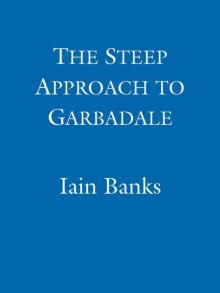 The Steep Approach to Garbadale
The Steep Approach to Garbadale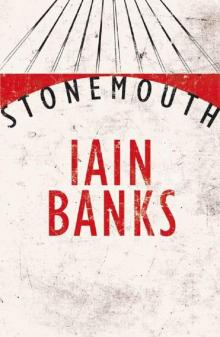 Stonemouth
Stonemouth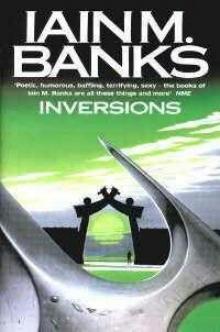 Inversions c-6
Inversions c-6 Raw Spirit: In Search of the Perfect Dram
Raw Spirit: In Search of the Perfect Dram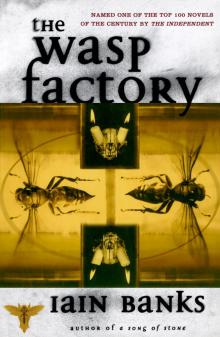 The Wasp Factory
The Wasp Factory Raw Spirit
Raw Spirit Walking on Glass
Walking on Glass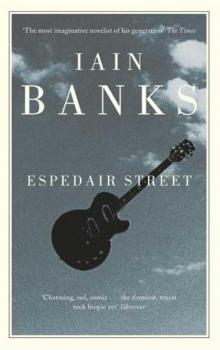 Espedair Street
Espedair Street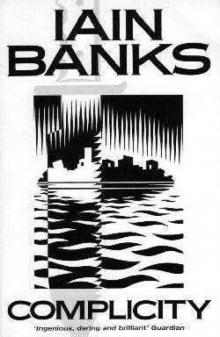 Complicity
Complicity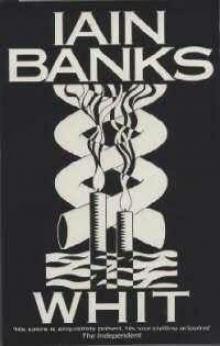 Whit
Whit Dead Air
Dead Air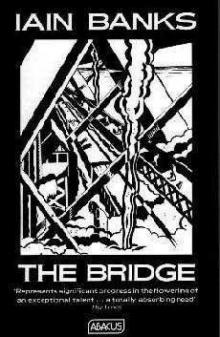 The Bridge
The Bridge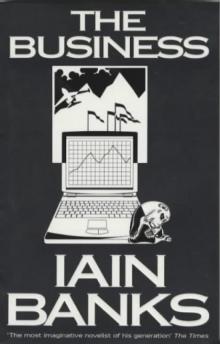 The Business
The Business Canal Dreams
Canal Dreams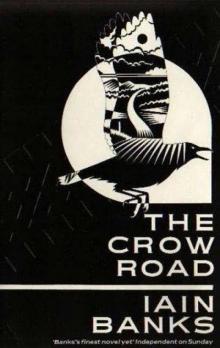 The Crow Road
The Crow Road